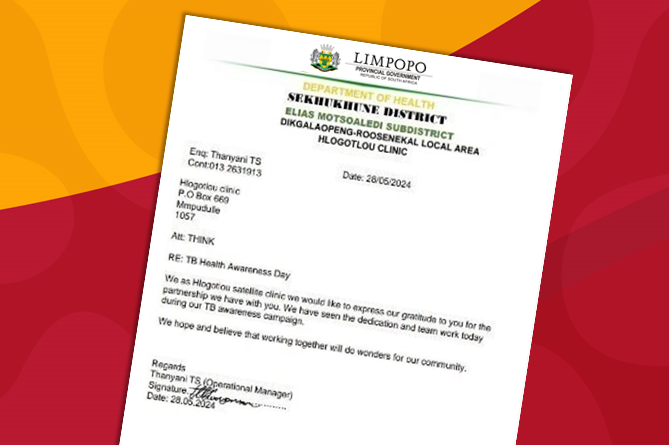At Hlogotlou Clinic in Sekhukhune District, the ACCELERATE 2 THINK team, working alongside facility staff, identified four tuberculosis (TB) patients that have missed their treatment appointments. Three of these were successfully located and relinked to care, but one patient, a taxi queue marshal at a busy, high-traffic taxi rank, refused to return for treatment. This raised concern, since without treatment he posed a significant risk of TB transmission to passengers and fellow workers at this very crowded location.
To address the situation and actively involve the community in TB prevention and treatment adherence effort, the THINK roving team in partnership with the clinic, organized an awareness campaign at the taxi rank. The team located the TB patient and through counselling he was encouraged to continue with this treatment. His family and colleagues were also given adherence counselling to understand the importance of completing the full course of TB treatment and to support him in his TB journey.
To ensure that his 26 colleagues and family did not contract the disease, they were all screened and tested using the mobile digital chest X-ray unit. Three were presumptive, but GeneXpert (GXP) testing returned negative results for TB. All 26 were then initiated on TB Preventative Treatment (TPT) which reduces future risk of developing TB.
Providing health services and education about TB among the 158 participants at the taxi rank has raised awareness and willingness to adhere to treatment, garnering positive feedback from this community. The initiative also strengthened the clinic’s healthcare workers’ tracing and re-engagement strategies for lost to follow up patients, leading to quicker interventions and better community trust. The Hlogotlou Clinic formally thanked the THINK team for its collaborative efforts and dedication, envisioning a long-term partnership.
By targeting vulnerable, high-contact populations and equipping healthcare workers, community campaigns like these bolster the community’s trust in healthcare services which is critical for sustainable TB management and prevention.

